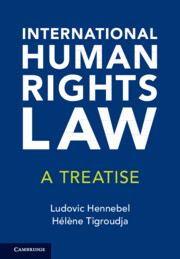Book contents
- International Human Rights Law
- International Human Rights Law
- Copyright page
- Dedication
- Contents
- About the Authors
- Acknowledgments
- Note on the Text
- Table of Cases
- Abbreviations
- Part I Foundations of International Human Rights Law
- Part II The Machinery of International Human Rights Law
- Part III The Interpretation of International Human Rights Law
- Title 6 The Hermeneutics of International Human Rights Organs
- Title 7 International Legal Regime of Human Rights and Freedoms
- Title 8 Rights and Freedoms
- Part IV Remedies and Implementation of International Human Rights Decisions
Title 6 - The Hermeneutics of International Human Rights Organs
from Part III - The Interpretation of International Human Rights Law
Published online by Cambridge University Press: 10 April 2025
- International Human Rights Law
- International Human Rights Law
- Copyright page
- Dedication
- Contents
- About the Authors
- Acknowledgments
- Note on the Text
- Table of Cases
- Abbreviations
- Part I Foundations of International Human Rights Law
- Part II The Machinery of International Human Rights Law
- Part III The Interpretation of International Human Rights Law
- Title 6 The Hermeneutics of International Human Rights Organs
- Title 7 International Legal Regime of Human Rights and Freedoms
- Title 8 Rights and Freedoms
- Part IV Remedies and Implementation of International Human Rights Decisions
Summary
This title focuses on the interpretative methodologies and principles employed by international human rights organs in applying and developing human rights norms. It explores the role of various interpreters, including international, regional, and national courts, in shaping the meaning and scope of human rights. The section examines the methods of interpretation used by human rights bodies, such as textual, contextual, purposive, and evolutionary approaches, and the challenges in ensuring consistency and coherence across different jurisdictions. It also discusses the purposes of interpretation, including the protection of human rights, the development of international human rights law, and the promotion of judicial dialogue and coherence. By analyzing the interpretative practices of human rights organs, this title aims to provide a deeper understanding of the dynamics of human rights interpretation and the factors influencing the application of human rights norms in diverse legal and cultural contexts.
Keywords
- Type
- Chapter
- Information
- International Human Rights LawA Treatise, pp. 441 - 472Publisher: Cambridge University PressPrint publication year: 2025

